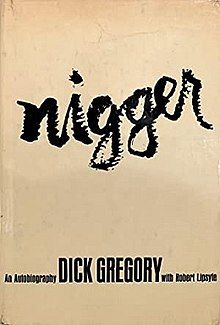Nigger: An Autobiography by Dick Gregory
 First hard cover edition | |
| Author | Dick Gregory, with Robert Lipsyte |
|---|---|
| Subject | African American culture, Asian American culture |
| Genre | Autobiography |
| Publisher | E. P. Dutton h/b Pocket Books p/b |
Publication date | September 1964 |
| Media type | Hardcover |
| Pages | 209 |
| Followed by | Write Me In! (1968) |
The autobiography of comedian and social activist Dick Gregory, co-authored with Robert Lipsyte, nigger was originally published in September 1964 by E. P. Dutton, and has since 1965 been reprinted numerous times in an edition available through Pocket Books, altogether selling more than one million copies to date.[1] The book has never been out of print since its publication.[2] Gregory continued his life story in two subsequent books, Up From Nigger and Callus On My Soul. Gregory earned a $200,000 advance from the book.[3]
Origins
[edit]It was written during the American Civil Rights Movement. Gregory comments on his choice of title in the book's primary dedication, addressing his late mother,
Dear Momma -- Wherever you are, if ever you hear the word "nigger" again, remember they are advertising my book.[4]
Table of contents
[edit]- Not Poor, Just Broke
- "...and they didn't even have what I wanted."
- One Less Door
The book contains photographs of Gregory performing at the Village Gate; he and his brother (1942); his mother, Lucille; Gregory as a drummer at Southern Illinois University (1953); as an SIU sprinter and Outstanding Athlete of the Year (1953); with coach Leland Lingle (1954); with Sammy Davis Jr. at Roberts Show Club, Chicago (1959); in a jail cell in Chicago; performing at the Hungry i, San Francisco (1963, shortly before the murder of Medgar Evers); at a voter registration rally, Greenwood, Mississippi (April 1963), among others.
Quotes
[edit]Addressing his maternal ancestors again,
You didn't die a slave for nothing, Momma. You brought us up. You and all those Negro mothers who gave their kids the strength to go on, to take that thimble to the well while the whites were taking buckets. Those of us who weren't destroyed got stronger, got calluses on our souls. And now we're ready to change a system, a system where a white man can destroy a black man with a single word. Nigger.[5]
Cover title
[edit]The original book cover stylizes the main title, "nigger", in all lower case, cursive writing. The title in its other appearances is otherwise formatted as most other books, either in all uppercase, or with normal book title capitalization.
Reception
[edit]The New York Times wrote, in its review,
Powerful and ugly and beautiful...a moving story of a man who deeply wants a world without malice and hate and is doing something about it."[6]
The book has been the subject of critical commentary, particularly in reference to its use of the pejorative term as the title.[7][8] It remains one of his best known works.[9]
In 2016, the Dean of Matteo Ricci College at Seattle University was forced to resign after students protested her recommending the book to an African-American student.[10] While the controversy was ongoing, Dick Gregory published an article supporting her against the protesters.[11]
See also
[edit]- The Nigger Bible, a 1967 analysis of the word, with a preface by Gregory
References
[edit]- ^ Gregory, Dick (1986) [First published 1964]. Nigger; an autobiography by Dick Gregory. Pocket Books. ISBN 0671735608. Retrieved 9 August 2019.
- ^ Lipsyte, Robert (8 August 2019). "Tomgram: Robert Lipsyte, A Comic Stands Up to Racism". Tom Dispatch. Retrieved 9 August 2019.
- ^ "Obituary: Richard "Dick" Gregory died on August 19th". The Economist. 7 September 2017.
- ^ "Dick Gregory Global Watch - About Dick Gregory". Dickgregory.com. 1932-10-12. Archived from the original on 2007-06-17. Retrieved 2013-10-08.
- ^ Autobiographical Occasions and Original Acts: Versions of American Identity From Henry Adams to Nate Shaw, Albert E. Stone, University of Pennsylvania Press, 1982, page 238
- ^ Nigger, Dick Gregory with Robert Lipsyte. New York: Pocket Books, 1965 (12th printing), Standard Book Number 671-7509
- ^ Ridley, John (2006-12-03). "Viewpoint: Why I'm Good with the N Word". TIME. Archived from the original on December 6, 2006. Retrieved 2013-10-08.
- ^ ""Mark Twain threw it up in the air and I grabbed it" | The Book Haven". Bookhaven.stanford.edu. 2010-04-21. Retrieved 2013-10-08.
- ^ "Dick Gregory, Bestselling Author of "Nigger" says Occupy Wall Street Has Whiff of 1960s - BCNN1". Blackchristiannews.com. 2011-10-10. Archived from the original on 2012-04-25. Retrieved 2013-10-08.
- ^ Jaschik, Scott (July 25, 2016). "Under Fire, a Dean Departs". Inside Higher Ed. Archived from the original on June 5, 2020.
- ^ Gregory, Dick (May 25, 2016). "Language, Racism and a Protest". Inside Higher Ed. Archived from the original on June 5, 2020.
